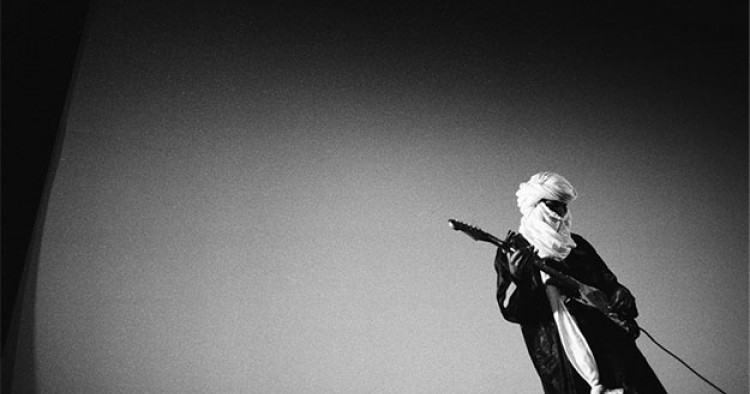Mdou Moctar recently finished his first U.S. tour. In his three October performances in Washington, he set out to do a lot. Pickless, his kinetic guitar licks bounced around the stage, bringing his audience thousands of miles away to the Sahara desert. His calm, welcoming voice sang about the struggles and hopes of his divided homeland.
“I sing about the divisions the Tuareg people face. Still, even with borders, music can keep us together,” Mdou said. According to Mdou, his latest album, Sousome Tamachek, conveys “the origins of my people.” There are about 2.5 million Tuaregs spread across North Africa and the Sahel. Traditionally a semi-nomadic people, the Tuareg violently resisted French colonists in the late 19th century. During the 1960s, their territory was divided between modern-day Libya, Algeria, Niger, Mali, and Burkina Faso. This transition from colonialism to fractured independence served to restrict the movement and resources of the Tuareg, provoking a series of uprisings. Protest music helped crystallize a strong identity.
The Rebelliousness of Tuareg Desert Blues
Mdou’s guitar-driven style of music is known as assouf among the Tuaregs and it both lyrically and tonally evokes a feeling of homesickness. The style became popular with Tinariwen, a collective that began to play together in the late 1970s in Tuareg refugee camps in Algeria and later in Libya. In 1980, then Libyan leader Muammar Qaddafi issued a decree requiring all young Tuareg men to receive military training in Libya. Qaddafi wanted to form a Saharan regiment to support his territorial ambitions in the Sahel region. The original members of Tinariwen enlisted and were exposed to a wide variety of Western rock and blues music, most notably Jimi Hendrix. They refined their style – a fusion of Tuareg melodies and North African protest music, electrified by the western guitar. Some of them even went on to fight against the Malian army from 1990-1991. Tinariwen brought pride to the ishumar, the wandering young Tuareg exiles whose traditional ways of life were coming into conflict with the realities of modern statehood.
By the turn of the millennium, Tinariwen had achieved international fame and inspired a host of Tuareg rockers. Bombino, Tamikrest, and others have since contributed to and tweaked Tinariwen’s assouf genre of Desert blues. Mdou was able to nudge his way into this crowded scene. When asked how he is different than the others, he responded with a toothy grin, “I play my guitar much faster.”
Mdou Moctar’s Traditional, Innovative Sound
Mdou’s wry comment doesn’t explain the whole story. Born in Abalak, in the Azawagh desert of Niger, he fell in love with the guitar when he was 15. He saw a musician playing one in the outskirts of Agadez. Guitars were hard to come by, particularly one to suit Mdou’s left hand. “So I made my own guitar with my hands,” he said. “I began to play traditional desert blues at local weddings, but slowly started to add to it.” In 2008, he travelled to Nigeria to record his first album, Anar. The album spread—mostly by fans sharing his music via mobile phones—making him a local star. He continued to record, defining his assouf-based sound by adding psychedelic guitar riffs, Auto-Tuned vocals, and morose bass loops from a drum machine.
Christopher Kirkley, Mdou’s manager, believes, “Mdou differentiates himself largely by composing songs. A lot of Tuareg guitarists in the wedding scene in Agadez, including some of the more famous international acts, play a lot of cover songs, by other bands. They are not composers. Mdou prides himself on this.” Kirkley added, “Another aspect that he incorporates into his music is the traditional sound of takamba - this is pre-guitar music from the region, and his rhythm borrows the style of this traditional playing. It's a very specific reference, and hard to pick up, but noticeable to those more familiar with local sounds.”
In 2015, he became an international star by playing the lead role in the semi-biopic Akounak Tedalat Taha Tazoughai (Rain the Color of Blue with a Little Red in It)--the first feature film in the Tuareg language of Tamashek. In the film, set in Agadez and inspired by Prince’s 1984 Purple Rain, Mdou plays the Prince-like main character. On screen, he must overcome his real-life parents’ initial—and real-life—disdain for his music. Through sweeping shots of Mdou riding on his purple motorcycle, the audience is introduced to Tuareg culture and music. In the film’s sonic conclusion, Mdou defeats his rival in a battle of the bands to become the musical star of Agadez.
Mdou feels that his American crowds are only getting half of what they pay for: “I want them to learn to understand the message of my words and not just how I play guitar.” Still, both Mdou and Kirkley are “overwhelmed by [its] glowing reviews and success." Several of the shows sold out. Kirkley elaborated, “People in general left surprised. They came expecting a good show, but got a lot more.”
First photo: Mdou Moctar prides himself by the speed at which he can play his hypnotic guitar riffs. Photo credit: Kentaro Murai
Second photo: According to Mdou Moctar's manager, Mdou differentiates himself from other Tuareg guitarists in that he composes his own songs and incorporates traditional influences, such as takamba. Photo credit: Jerome Fino
The Middle East Institute (MEI) is an independent, non-partisan, non-for-profit, educational organization. It does not engage in advocacy and its scholars’ opinions are their own. MEI welcomes financial donations, but retains sole editorial control over its work and its publications reflect only the authors’ views. For a listing of MEI donors, please click here.













